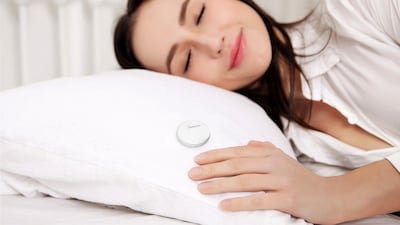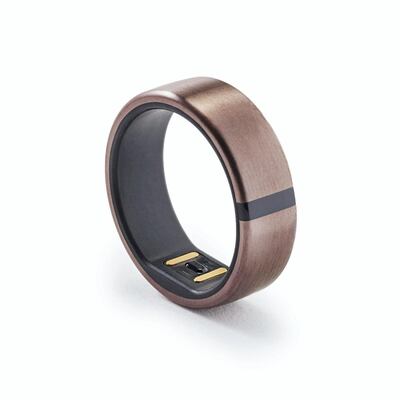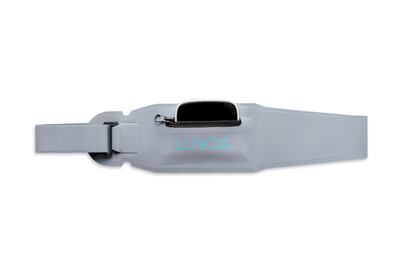The sheer volume and versatility of products that are designed to help people sleep better go beyond our wildest dreams. From sleep trackers in all shapes and sizes to duvets that are hot and cold at different ends (who says bedfellows need to compromise?), to alarm clocks that can programme tea or coffee come morning, the market is replete with gadgets that prove sleep may well be the ultimate luxury. Yet, despite the ease of access, myriad studies and statistics suggest it's never been harder to get a good night's rest.
A 2018 survey of more than 4,000 people in the UAE, conducted by Ikea, reported that 47 per cent of residents do not get enough sleep every day, with 22 per cent saying they found themselves falling asleep during the day. As people look for ways to get in more shut-eye, the region's sleep aids market is estimated to reach $2.53 billion (Dh9.2bn) by 2023. Dubai even hosts an annual Sleep Expo, which is on until tomorrow at the World Trade Centre, and looks at the latest advances in the market.
“The popularity of sleep products is not surprising. More than a quarter of the global population is either diagnosed with or suffering from borderline insomnia,” says Dr Upasana Gala, a neuroscientist and founder of Evolve Brain Training. “While children between the ages of 5 and 12 require a minimum of 10 to 11 hours of sleep, adolescents and adults need to get at least seven or eight hours of good-quality sleep to be energised and refreshed throughout the day. But with our current lifestyles, it is not always possible to follow this. That’s why more people are turning to sleeping aids,” she adds.
Hady Jerdak, a sleep specialist and chief executive of Harley Street Medical Centre, says the most common reasons patients visit the clinic are insomnia and obstructive sleep apnea. The latter is a disorder that disrupts one's breathing during the sleep cycle, and can be caused by a number of reasons – from obesity to jaw position. When it comes to insomnia, however, the main cause is stress, says Jerdak. "Sometimes, it can also be due to medical reasons. But, in my experience, 95 per cent of the time, it is due to stress and anxiety. We all have problems in our lives, and that affects our sleep patterns."
What does it take to get a good night's sleep?
Telling a person to stress less may be a moot point, but there are a number of regular practices that may improve sleep quality. Jerdak believes it's all about going back to basics. "A good night's sleep needs a good environment. That means the room has to be dark, silent and not too hot or cold. Avoid coffee and screens, and go to bed and wake up at roughly the same time [every day]."
Gala adds that practising mindful relaxation and breathing exercises sends a signal to the brain that it's time to wind down for the day, while a walk or exercise session can improve sleep quality. "Try a warm shower before bedtime, and only get into bed when it is time to sleep. Adopting these kinds of daily 'before sleep' rituals can help," she says. Some adults find it soothing to drink herbal teas and get regular massages.
Screens are harmful for sleep
Ask most professionals about the big factor disrupting sleep patterns today, and screens are bound to pop up. The obvious distraction and temptation to binge-watch aside, lighting is the main culprit. "Exposure to blue light from screens at night suppresses the melatonin production in the brain and can significantly shift your circadian rhythm," Gala explains. If you find avoiding screens before bedtime impossible, fret not – there's technology to solve that problem, too, such as blue-light filter apps that can be downloaded on to devices.
Jeroen Tas, chief innovation and strategy officer of Philips, who was in the UAE for the Arab Health conference last month, reiterates the role the right light plays. "Your circadian rhythm is very sensitive to light. I have a lighting system that adjusts to the time and preps me for the day. That is, if you come to my home in the evening, you'll see that the lights are low and vice versa." The science is clear: the human body is designed to feel sleepy in red light, while blue light at night wreaks havoc on the system.
The sleep industry: anything but sluggish
Philips has been at the forefront of the sleep industry, conducting annual global surveys and releasing products for conditions from apnea to snoring. The SmartSleep Snoring Relief Band, for instance, uses a sensor to monitor sleeping positions (and nudges a person to a position that avoids snoring), while the Deep Sleep Headband offers a "complete solution" for those not getting enough rest. Other than sleep tracking, the band uses sensors to detect when one is fast asleep, then "triggers quiet audio tones to improve the quality of sleep". The company's Somneo Sleep and Wake-up Light alarm clock, meanwhile, wakes people up gently by glowing to simulate sunrise, and also has a light-guided wind-down function.
The surge in sleep products and manufacturers has also led to events such as Sleep Expo Middle East, which hosts product launches and panel discussions by sleep experts on topics such as mattress innovation, technical advances in fabrics and sleep tech. Taher Patrawala, director of Media Fusion, which is organising the event, says customers today are very aware about the importance of sleep and the functionalities of various products, and are happy to invest in a solution that will help their overall well-being.
“Keep in mind there is no one solution that fits all in this market; every individual has different needs that can enable them to have a good night’s sleep,” adds Patrawala. “Try out a variety of products before settling on what works for you best. Most importantly, lead a healthy and balanced lifestyle that ensures you don’t compromise on your sleep.”
Five gadgets to help you slip into slumber
Sleep and Fitness Tracking Ring
There are a number of sleep trackers on the market today, but this latest device by Motiv, available at the new B8ta store in The Dubai Mall, offers almost all the benefits of traditional trackers coupled with a sleek, minimalist design. The ring shape makes it more wearable for those who are uncomfortable going to bed with a band around the wrist. The device also boasts features such as a three-day battery life and 90-minute fast charge, and can be monitored through an app; Dh808
Mini Sleep Dot
Those not comfortable wearing any jewellery to bed can opt for this nifty device by Sleepace, which simply needs to be fastened to the pillow. It then monitors and tracks your sleep cycle, body movement and sleep time; Dh125, available at www.sprii.ae
NightBalance
Those suffering from obstructed sleep apnea can now breathe freely, literally, with this palm-sized device from Philips, available at large electronics retailers. It is meant to be worn across the chest when you sleep and can be fastened using the adjustable strap. Since sleep apnea is typically worse when you’re on your back, the device is programmed to recognise the position, then use gentle vibrations to prompt you to shift to your side without waking you up; Dh2,000
The DreamStation
Go Another product for those suffering from sleep apnea is the DreamStation Go by Philips, available at large electronics stores. The face mask has an air tube connection that delivers higher pressure to treat obstructed airflow when one is having an apnea or hypopnea episode. As a bonus, it is designed for travel, as it is lightweight and features a built-in power supply; Dh4,000 (without accessories)
Rollaway Bed

If you're unable to get a good night's rest on an unfamiliar mattress, why not carry yours around with you wherever you go? The Rollaway Bed by Saba Plastics, which will launch at this year's Sleep Expo Middle East, is designed to fold and fit into small spaces, and can easily be moved according to convenience; $400 (Dh1,470)




